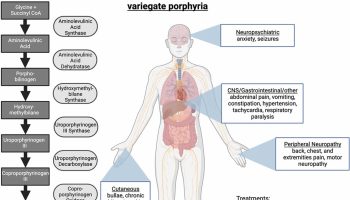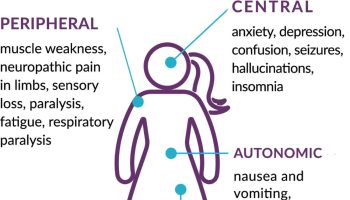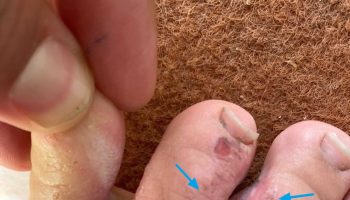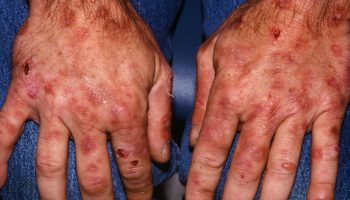What is doxepin
Doxepin is a type of medicine called a tricyclic antidepressant (TCA). Doxepin is available as a capsule and liquid that is used to treat depression and anxiety. Doxepin works by increasing the amounts of certain natural substances in the brain that are needed for mental balance.
Doxepin (Silenor) is also available as a tablet to treat insomnia (difficulty falling asleep or staying asleep) in people who have trouble staying asleep. Doxepin works by slowing activity in the brain to allow sleep.
A small number of children, teenagers, and young adults (up to 24 years of age) who took antidepressants (‘mood elevators’) such as doxepin during clinical studies became suicidal (thinking about harming or killing oneself or planning or trying to do so). Children, teenagers, and young adults who take antidepressants to treat depression or other mental illnesses may be more likely to become suicidal than children, teenagers, and young adults who do not take antidepressants to treat these conditions. However, experts are not sure about how great this risk is and how much it should be considered in deciding whether a child or teenager should take an antidepressant. Children younger than 18 years of age should not normally take doxepin, but in some cases, a doctor may decide that doxepin is the best medication to treat a child’s condition.
You should know that your mental health may change in unexpected ways when you take doxepin or other antidepressants even if you are an adult over age 24. You may become suicidal, especially at the beginning of your treatment and any time that your dose is increased or decreased. You, your family, or your caregiver should call your doctor right away if you experience any of the following symptoms: new or worsening depression; thinking about harming or killing yourself, or planning or trying to do so; extreme worry; agitation; panic attacks; difficulty falling asleep or staying asleep; aggressive behavior; irritability; acting without thinking; severe restlessness; and frenzied, abnormal excitement. Be sure that your family or caregiver knows which symptoms may be serious so they can call the doctor if you are unable to seek treatment on your own.
Your healthcare provider will want to see you often while you are taking doxepin, especially at the beginning of your treatment. Be sure to keep all appointments for office visits with your doctor.
The doctor or pharmacist will give you the manufacturer’s patient information sheet (Medication Guide) when you begin treatment with doxepin. Read the information carefully and ask your doctor or pharmacist if you have any questions. You also can obtain the Medication Guide from the FDA website: https://www.fda.gov/Drugs/DrugSafety/ucm085729.htm
No matter your age, before you take an antidepressant, you, your parent, or your caregiver should talk to your doctor about the risks and benefits of treating your condition with an antidepressant or with other treatments. You should also talk about the risks and benefits of not treating your condition. You should know that having depression or another mental illness greatly increases the risk that you will become suicidal. This risk is higher if you or anyone in your family has or has ever had bipolar disorder (mood that changes from depressed to abnormally excited) or mania (frenzied, abnormally excited mood) or has thought about or attempted suicide. Talk to your doctor about your condition, symptoms, and personal and family medical history. You and your doctor will decide what type of treatment is right for you.
What is doxepin used for
Doxepin is available as a capsule and liquid that is used to treat depression and anxiety.
Doxepin (Silenor) is also available as a tablet to treat insomnia (difficulty falling asleep or staying asleep) in people who have trouble staying asleep.
Doxepin for sleep
Doxepin (Silenor) comes as a tablet to take by mouth. It is usually taken once a day, within 30 minutes of bedtime. Do not take doxepin (Silenor) within 3 hours of a meal. Follow the directions on your prescription label carefully, and ask your doctor or pharmacist to explain any part you do not understand. Take doxepin (Silenor) exactly as directed. Do not take more or less of it or take it more often than prescribed by your doctor.
You will probably become very sleepy soon after you take doxepin (Silenor) and will remain sleepy for some time after you take the medication. Plan to go to bed right after you take doxepin (Silenor) and to stay in bed for 7 to 8 hours. Do not take doxepin (Silenor) if you will be unable to go to bed right away and remain asleep for 7 to 8 hours after taking the medication.
You should begin to sleep better during the first few days of treatment with doxepin (Silenor). If your sleep does not improve within 7-10 days, or gets worse call your doctor.
Your doctor or pharmacist will give you the manufacturer’s patient information sheet (Medication Guide) when you begin treatment with doxepin (Silenor) and each time you refill your prescription. Read the information carefully and ask your doctor or pharmacist if you have any questions. You can also visit the Food and Drug Administration (FDA) website (https://www.fda.gov/Drugs/DrugSafety/ucm085729.htm) to obtain the Medication Guide.
You should not use doxepin (Silenor) if you have untreated narrow-angle glaucoma or severe problems with urination.
Do not use doxepin (Silenor) if you have used an monoamine oxidase (MAO) inhibitor in the past 14 days. A dangerous drug interaction could occur. Monoamine oxidase (MAO) inhibitors include isocarboxazid, linezolid, methylene blue injection, phenelzine, rasagiline, selegiline, tranylcypromine, and others.
Some people using doxepin (Silenor) have engaged in activity such as driving, eating, or making phone calls and later having no memory of the activity. If this happens to you, stop taking doxepin (Silenor) and talk with your doctor.
You should not use doxepin (Silenor) if you are allergic to doxepin, or if you are allergic to antidepressants such as amitriptyline, amoxapine, clomipramine, desipramine, imipramine, nortriptyline, protriptyline, or trimipramine.
Doxepin Pregnancy Warnings
US FDA pregnancy category C: Animal reproduction studies have shown an adverse effect on the fetus and there are no adequate and well-controlled studies in humans, but potential benefits may warrant use of the drug in pregnant women despite potential risks.
Doxepin should be used during pregnancy only if clearly needed and the benefit outweighs the risk to the fetus. Withdrawal symptoms in newborn infants have been reported following prolonged maternal use of tricyclic antidepressants.
Doxepin Breastfeeding Warnings
Use of doxepin during breastfeeding is not recommended.
According to some authorities: Use of doxepin during breastfeeding is contraindicated.
Excreted into human milk: Yes
Comments:
- Apnea (temporary cessation of breathing) and drowsiness have been reported in the nursing infant.
- If treatment is required in a mother of an older infant, the nursing infant should be monitored carefully for excessive sedation and adequate weight gain.
Doxepin for sleep or insomnia special precautions
Before taking doxepin (Silenor)
- tell your doctor and pharmacist if you are allergic to doxepin (Silenor), amoxapine, loxapine, any other medications, or any of the ingredients in doxepin (Silenor) tablets. Ask your pharmacist or check the Medication Guide for a list of the ingredients.
- tell your doctor if you are taking a monoamine oxidase (MAO) inhibitor such as isocarboxazid (Marplan), phenelzine (Nardil), selegiline (Eldepryl, Emsam, Zelapar), and tranylcypromine (Parnate), or if you have stopped taking an MAO inhibitor within the past 14 days. Also tell your doctor if you are taking or receiving methylene blue (Provayblue) or linezolid (Zyvox). Your doctor will probably tell you not to take doxepin. If you stop taking doxepin, you should wait at least 14 days before you start to take an MAO inhibitor.
- tell your doctor and pharmacist what other prescription and nonprescription medications, vitamins, nutritional supplements, and herbal products you are taking or plan to take. Be sure to mention any of the following: cimetidine (Tagamet); medications for cough, cold, or allergies; quinidine (in Nuedexta); sedatives; selective serotonin reuptake inhibitors (SSRIs) such as citalopram (Celexa), escitalopram (Lexapro), fluoxetine (Prozac, Sarafem, Selfemra, in Symbyax), fluvoxamine (Luvox), paroxetine (Brisdelle, Paxil, Pexeva), and sertraline (Zoloft); other sleeping pills; tolazamide; and tranquilizers. Your doctor may need to change the doses of your medications or monitor you carefully for side effects. Many other medications may also interact with doxepin (Silenor), so be sure to tell your doctor about all the medications you are taking, even those that do not appear on this list.
- tell your doctor if you have or have ever had glaucoma that is not being treated, or urinary retention (inability to empty your bladder completely or at all). Your doctor may tell you not to take doxepin (Silenor).
- tell your doctor if you have or have ever drunk large amounts of alcohol, used street drugs, or over-used prescription medications. Also tell your doctor if you have or have ever had depression, mental illness, suicidal thoughts, sleep apnea (a sleep disorder that causes breathing to stop for short periods during sleep), or kidney or liver disease.
- tell your doctor if you are pregnant, plan to become pregnant, or are breast-feeding. If you become pregnant while taking doxepin (Silenor), call your doctor.
- you should know that doxepin (Silenor) may make you drowsy. Do not drive a car, operate machinery, or do other dangerous activities at night after taking doxepin (Silenor). Do not drive a car or operate machinery the next day until you know how this medication affects you.
- you should know that alcohol can add to the drowsiness caused by this medication. Do not drink alcohol while you are taking doxepin (Silenor).
- you should know that some people who took doxepin (Silenor) got out of bed and drove their cars, prepared and ate food, had sex, made phone calls, were sleep-walking, or were involved in other activities while not fully awake. After they woke up, these people were usually unable to remember what they had done. Call your doctor right away if you find out that you have been driving or doing anything else unusual while you were sleeping.
What other drugs will affect doxepin?
Taking doxepin (Silenor) with other drugs that make you sleepy or slow your breathing can increase these effects. Ask your doctor before taking Silenor with a sleeping pill, narcotic pain medicine, muscle relaxer, or medicine for anxiety, depression, or seizures.
Before taking doxepin (Silenor), tell your doctor if you have used an “SSRI” (selective serotonin reuptake inhibitor) antidepressant in the past 5 weeks, such as citalopram, escitalopram, fluoxetine, fluvoxamine, paroxetine, or sertraline.
Tell your doctor about all medicines you use, and those you start or stop using during your treatment with doxepin (Silenor), especially:
- cimetidine (Tagamet);
- tolazamide (Tolinase); or
- cold or allergy medicine that contains an antihistamine (such as Benadryl).
This list is not complete. Other drugs may interact with doxepin, including prescription and over-the-counter medicines, vitamins, and herbal products. Not all possible interactions are listed in this medication guide.
Doxepin dosage
Adult Dose for Insomnia
Use: For the treatment of insomnia characterized by difficulty with sleep maintenance; clinical trials in support of efficacy were up to 3 months duration.
- 6 mg orally once a day; 3 mg once a day may be appropriate for some patients
- Maximum dose: 6 mg/day
Comments: Dosages should be individualized based on the needs of each patient.
Geriatric Dose for Insomnia
Use: For the treatment of insomnia characterized by difficulty with sleep maintenance; clinical trials in support of efficacy were up to 3 months duration.
- 3 mg orally once a day; may increase to 6 mg/day if clinically indicated
- Maximum dose: 6 mg/day
Comments:
- Dosages should be individualized based on the needs of each patient.
- Sleep-promoting drugs may cause confusion and over-sedation in the elderly; a starting dose of 3 mg and evaluation prior to considering dose escalation is recommended.
Adult Dose for Anxiety
Uses: For the treatment of psychoneurotic patients with depression and/or anxiety; for the treatment of depression and/or anxiety associated with alcoholism; for the treatment of depression and/or anxiety associated with organic disease; and for the treatment of psychotic depressive disorders with associated anxiety including involutional depression and manic-depressive disorders.
- Initial dose: 75 mg orally once a day
- Maintenance dose: 75 to 150 mg orally once a day or in divided doses; patients with very mild disease may be adequately controlled with 25 to 50 mg per day
- Maximum dose: 150 mg/day
- Doxepin concentrate (oral liquid) comes with a specially marked dropper for measuring the dose. Ask your pharmacist to show you how to use the dropper. Dilute the concentrate in 4 ounces (120 mL) of water; whole or skim milk; or orange, grapefruit, tomato, prune, or pineapple juice just before taking it. Do not mix it with carbonated beverages (soft drinks).
Comments:
- More severely ill patients may require higher doses with a gradual increase to 300 mg/day; additional therapeutic benefit is rarely obtained with doses greater than 300 mg/day.
- Dosages may be increased or decreased following initial dose at appropriate intervals and based on individual patient response.
- The anti-anxiety effect is apparent before the antidepressant effect; may take 2 to 3 weeks for optimal antidepressant effect to be seen.
- The 150 mg capsule is intended for maintenance therapy and should not be used for initiation of treatment.
Adult Dose for Depression
Uses: For the treatment of psychoneurotic patients with depression and/or anxiety; for the treatment of depression and/or anxiety associated with alcoholism; for the treatment of depression and/or anxiety associated with organic disease; and for the treatment of psychotic depressive disorders with associated anxiety including involutional depression and manic-depressive disorders.
- Initial dose: 75 mg orally once a day
- Maintenance dose: 75 to 150 mg orally once a day or in divided doses; patients with very mild disease may be adequately controlled with 25 to 50 mg per day
- Maximum dose: 150 mg/day
- Doxepin concentrate (oral liquid) comes with a specially marked dropper for measuring the dose. Ask your pharmacist to show you how to use the dropper. Dilute the concentrate in 4 ounces (120 mL) of water; whole or skim milk; or orange, grapefruit, tomato, prune, or pineapple juice just before taking it. Do not mix it with carbonated beverages (soft drinks).
Comments:
- More severely ill patients may require higher doses with a gradual increase to 300 mg/day; additional therapeutic benefit is rarely obtained with doses greater than 300 mg/day.
- Dosages may be increased or decreased following initial dose at appropriate intervals and based on individual patient response.
- The anti-anxiety effect is apparent before the antidepressant effect; may take 2 to 3 weeks for optimal antidepressant effect to be seen.
- The 150 mg capsule is intended for maintenance therapy and should not be used for initiation of treatment.
Dose Adjustments
Obstructive sleep apnea
- Doxepin has not been studied in patients with obstructive sleep apnea.
Recommendations:
- Due to the possibility of this drug to depress respiratory drive, precautions should be taken if prescribed to patients with compromised respiratory function.
- Use should be avoided in patients with severe sleep apnea.
Elderly
- Capsules and Oral Concentrate: Dose selection should be cautious and initiated at the lower end of the dosing range due to increased risk of concomitant hepatic, renal, or cardiac dysfunction.
- Doxepin meets Beers Criteria: avoid doses of more than 6 mg/day in older adults.
Renal Dose Adjustments
No adjustment recommended.
Liver Dose Adjustments
Capsules and Oral Concentrate: Data not available
Tablets: Initiate treatment with 3 mg orally once a day; monitor closely for adverse daytime effects
What should I do if I forget a dose?
Doxepin (Silenor) should only be taken at bedtime. If you did not take doxepin (Silenor) before you went to bed and you are having trouble sleeping, you may take doxepin (Silenor) if you will be able to stay in bed for at least 7 to 8 hours afterward. Do not take a double dose of doxepin (Silenor) to make up for a missed dose.
Doxepin side effects
Doxepin (Silenor) may cause side effects.
Common doxepin (Silenor) side effects may include:
- drowsiness, tired feeling;
- nausea;
- dizziness;
- vision changes; or
- cold symptoms such as stuffy nose, sneezing, sore throat.
Tell your doctor if any of these symptoms are severe or do not go away.
Get emergency medical help if you have any of these signs of an allergic reaction to doxepin (Silenor): hives; difficulty breathing; swelling of your face, lips, tongue, or throat.
Call your doctor at once if you have:
- blurred vision, tunnel vision, eye pain or swelling, or seeing halos around lights;
- fast, pounding, or uneven heart rate;
- hair loss;
- ringing in your ears;
- changes in sex drive;
- swollen testicles;
- increased breast size;
- yellowing of the skin or eyes;
- unusual bleeding or bruising;
- skin rash, itching, or swelling;
- milky discharge from nipples in females;
- confusion, hallucinations, unusual thoughts or behavior, seizure (convulsions);
- new or worsening symptoms of depression (mood or behavior changes, anxiety, trouble sleeping, feeling agitated, thoughts about suicide or hurting yourself.
- easy bruising or bleeding, unusual weakness;
- a light-headed feeling, like you might pass out;
- restless muscle movements in your eyes, tongue, jaw, or neck;
- tremors or uncontrollable shaking;
- little or no urinating; or
- extreme thirst with headache, nausea, vomiting, and weakness.
Some people using this doxepin (Silenor) have engaged in activity such as driving, eating, or making phone calls and later having no memory of the activity. If this happens to you, stop taking doxepin (Silenor) and talk with your doctor.
Doxepin (Silenor) may cause other side effects. See your doctor if you have any unusual problems while taking this medication.
Doxepin overdose
Doxepin overdose occurs when someone takes more than the normal or recommended amount of this medicine, either by accident or on purpose. Toxic level of a tricyclic antidepressant can build up in the body if the tricyclic antidepressant and other medicines interact. This interaction can affect how well the body can break down the tricyclic antidepressant.
Symptoms of doxepin overdose may include:
- irregular heart beat
- feeling agitated, confused, or drowsy
- trouble concentrating
- seizures
- muscle stiffness
- vomiting
- increase in pupil size
- hallucination (seeing things or hearing voices that do not exist)
- fever
- cold body temperature
- coma (loss of consciousness for a period of time).
Get medical help right away. DO NOT make the person throw up unless poison control or a health care provider tells you to.
Poison Control
Your local poison center can be reached directly by calling the national toll-free Poison Help hotline (1-800-222-1222) from anywhere in the United States. This national hotline number will let you talk to experts in poisoning. They will give you further instructions.
This is a free and confidential service. All local poison control centers in the United States use this national number. You should call if you have any questions about poisoning or poison prevention. It does NOT need to be an emergency. You can call for any reason, 24 hours a day, 7 days a week.
AIRWAYS AND LUNGS
- Slow breathing
- Difficulty breathing
BLADDER AND KIDNEYS
- Hard to start urinating
- Hard to empty bladder
EYES, EARS, NOSE, AND THROAT
- Blurred vision
- Ringing in the ears
HEART AND BLOOD
- Irregular heartbeat (may be fatal)
- Low blood pressure
- Shock
MOUTH, STOMACH, AND INTESTINAL TRACT
- Constipation
- Dry mouth
- Nausea and vomiting
- Unpleasant taste in mouth
NERVOUS SYSTEM
- Agitation, confusion
- Drowsiness, decreased alertness, coma
- Headache
- Muscle rigidity, lack of coordination
- Restlessness
- Seizures
SKIN
- Very sensitive to sunlight
What to Expect at the Emergency Room
Take the container with you to the hospital, if possible.
The provider will measure and monitor the person’s vital signs, including temperature, pulse, breathing rate, and blood pressure. Symptoms will be treated. The person may receive:
- Activated charcoal
- Blood and urine tests
- Breathing support, including oxygen and a tube through the mouth into the lungs
- Chest x-ray
- CT scan (advanced imaging) of the brain
- ECG (electrocardiogram, or heart tracing)
- Intravenous fluids (given through a vein)
- Laxative
- Medicine to treat symptoms
- Sodium bicarbonate, to counteract the effects of TCA overdose
- Catheter (thin, flexible tube) into the bladder if the person cannot urinate on their own
Doxepin overdose prognosis
How well a person does depends on the amount of medicine they swallowed and how quickly the treatment is received. The faster a person gets medical help, the better the chance for recovery.
Tricyclic depressant overdoses are very toxic and difficult to treat. Many people have died from TCA overdose, even with aggressive medical treatment.





